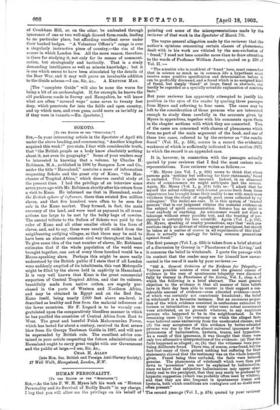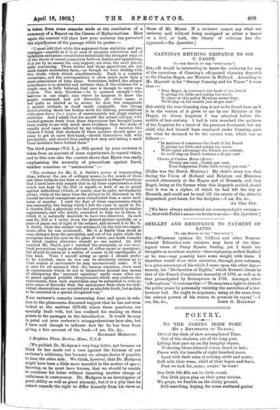HUMAN PERSONALITY.
[To THR Enrroa op THE " arsornos."] Sta,—As the late F. W. H. Myers left his work on "Human Personality and its Survival of Bodily Death" in my charge, I beg that you will allow me the privilege on his behalf of pointing out some of the misrepresentations made by the reviewer of that work in the Spectator of March 7th.
The vague general allegation made by the reviewer that the author's opinions concerning certain classes of phenoinena, dealt with in his work are vitiated by the non-exclusion of "fraud," I need not here consider more than to draw attention to the words of Professor William James, quoted on p. 239 of Vol. II. :— " The scientist who is confident of ' fraud ' here, must remember that in science as much as in common life a hypothesis must receive some positive specification and determination before it can be profitably discussed, and a fraud which is no assigned kind of fraud, but simply ' fraud ' at large, fraud in abstracto, can hardly be regarded as a specially scientific explanation of concrete facts.'
But your reviewer has apparently attempted to justify his position in the eyes of the reader by quoting three passages from Myers and referring to four cases. The eases may be left to the consideration of those persons who are interested enough to study them carefully in the accounts given by Myers in appendices, together with his comments upon them in the chapter sections with which they are connected. Two
of the cases are concerned with classes of phenomena which form no part of the main argument of the book, and one of these two cases, referred to by the reviewer as "the candle fraud" (Vol. II., p. 558), occurs in a record the evidential weakness of which is sufficiently indicated in the section (927) to which the record is an appended case.
It is, however, in connection with the passages actually quoted by your reviewer that I find the most serious mis- representations. Your reviewer writes as follows :—
" Mr. Myers (see Vol. I., p. 636) seems to think that where persons gain 'nothing but suffering for their statements,' fraud is excluded. This is quite unsound. Indeed, in an abnormal state of consciousness we might anticipate just the reverse. Again, Mr. Myers (Vol. I., p. 574) tells us : 'I admit that for myself the actual colloquy with trusted persons fresh from these experiences has brought home their reality to me with much more vividness than the study of equally good cases collected by ray colleagues.' The italics are ours. It is this system of 'trusted persons' that in our judgment vitiates the material evidence on the subject of spirit communication. Science has no right to trust anybody or anything. An astronomer would not trust a telescope without every possible test, and tha trusting of per- cipients is certainly far less scientific. Again (Vol. I., p. 582), Mr. Myers, speaking of sundry precautions, says that 'such pre- cautions imply no distrust of either agent or percipient, but should be taken as a matter of course in all experiments of this kind.' Hare is actually an apology for taking common precautions against fraud."
The first passage (Vol. I., p. 636) is taken from a brief abstract of a discussion by Gurney in "Phantasms of the Living," and it concerns the belief in witchcraft. I quote the passage with its context that the reader may see for himself how unwar- ranted is the use of it made by your reviewer :- "642 A. General Criticism of the Evidence for Telepathy.— Various possible sources of error and the general canons of evidence in the case of spontaneous telepathy were discussed fully by Gurney in Phantasms of the Living, Vol. I., chap. 4, of which the following is a brief abstract. The most general objection to the evidence is that all manner of false beliefs have in their day been able to muster in their support a con- siderable amount of evidence—even educated evidence—much of which was certainly not consciously fraudulent; the belief in witchcraft is a favourite instance. But an enormous propor- tion of the witch evidence consisted in confessions extracted by torture or intimidation; in many other cases actual occurrences were attributed, on no grounds whatever, to any suspicious persons who happened to be in the neighbourhood. In the remaining cases (1) the testimony on which the alleged facts were believed came exclusively from the uneducated classes; and (2) the easy acceptance of this evidence by better-educated persons was due to the then almost universal ignorance of the phenomena of hallucination, hysteria, trance, and hypnotism. As a result of this ignorance, it was thought that there were only two alternative interpretations of the evidende: (a) That the facts happened as alleged ; or, (b) that the witnesses were prac- tising deliberate fraud. There was, of course, some fraud, but the fact that many of them gained nothing but suffering for their statements showed that the testimony was on the whole honestly given. Fraud being thus excluded, the facts were believed genuine. The phenomena of witchcraft which were than put down to ' possession ' can now be explained by hallucination, since we know that subjective hallucinations may appear abso- lutely real to the percipient, that they may easily be produced by hypnotic suggestion (which was probably often used by witches), and that they are also frequent in spontaneous trance and hysteria, both which conditions are contagious and no doubt were often present." The second passage (Vol. I., p. 574) quoted by your reviewer is taken from some remarks made at the conclusion of a summary of a Report on the Census of Hallneinations. Here again the context will show how your reviewer has perverted the significance of the passage which he quotes :— "I must ltdd that while this argument from statistics and per-
. ventages—capable as it is at once of accurate estimation and of indefinite extension—constitutes technically the strongest support of the thesis of causal connection between deaths and apparitions, it is yet by no means the only support, nor even the most practi- cally convincing. Those deaths and those apparitions are not mere simple momentary facts,—as though we were dealing with two clocks which struck simultaneously. Each is a complex
occurrence, and the correspondence is often much more than a mere coincidence of time alone. Sometimes, indeed, the alleged coincidence is so detailed and intimate that, if the evidence for a single case is fully believed, that case is enough to carry con- viction. The man, therefore—he is common enough —who believes in one single case where he happens to know the people concerned, and yet discredits all other cases, is not quite so absurd as he, seems ; he does but exaggerate a mental attitude in itself easily explicable. One strong disintegrating shock has broken down his lifelong presumptions with more force thz:.i pages of unanswerable but dimly realised statistics. And I admit that for myself the actual colloquy with trusted persons fresh from these experiences has brought home their reality to me with much more vividness than the study of equally good cases collected by my colleagues. I mention this because I think that students of these matters should spare no pains to get at cases first-hand,—should themselves talk with percipients; and should thus realise how deep and lasting a mark these incidents leave behind them."
The third passage (Vol. I., p. 582) quoted by your reviewer is taken from an account of some experiments in crystal vision, and in this case also the context shows that Myers was really emphasising the necessity of precautions against fraud, whether conscious or " unconscious" :—
" The evidence for Mr. G. A. Smith's power of transmitting ideas, without the use of ordinary means, to the minds of these and other subjects has been so often discussed in these Proceedings that I need here only remark that in all these experiments a close watch was kept by Dr. Dill or myself, or both of us, to guard against indications (which, of course, may be quite involuntarily given), while at the same time the picture to be discerned in the crystal involved conceptions more complicated than a mere card- name or number. I omit the first of these experiments, which was successful, but during which I left the room to speak to Dr. J. Gordon Dill, a physician who had previously assisted in similar experiments, and who kindly consented to help me in these, in which it is naturally desirable to have two observers. In each case Dr. Dill or I wrote down the desired picture carefully on a piece of paper out of sight of the subject, and showed it to Mr. G. A. Smith, while the subject was entranced (in the last two experi- ments after he was awakened). Mr. G. A. Smith then stood at some distance from the percipient, and out of his sight, while the percipient fixed his eyes on the glass of water, and made remarks to which (unless otherwise stated) no one replied. Dr. Dill watched Mr. Smith, and I watched the percipient, or vice versa. Such precautions imply no distrust of either agent or percipient, but should be taken as a matter of course in all experiments of this kind. Were I myself acting as agent I should prefer to be watched, since no one can be absolutely certain as to what sounds or movements he may unconsciously make. If it is once for all assumed that the human organism, when used in experiments which do not in themselves present any means of eliminating the personal equation,' needs some other eye to guard against possible idiosyncrasies which may confuse the experiments, then such supervision may be submitted to with no more sense of discredit than the astronomer feels when his indi- vidual observations are accepted not as absolute truth, but as data to be corrected in a special recognised way."
'Your reviewer's remarks concerning time and space in rela- tion to the phenomena discussed suggest that he has not even looked at the sections (978-86) where these questions are specially dealt with, but has confined his reading on these points to the passages in the introduction. It would be easy to point out your reviewer's misapprehensions here also, but 'have said enough to indicate how far he has been from giving a fair account of the book.—I am, Sir, &c.,
RICHARD HODGSoN.
5 Boylston Place, Boston, Mass., U.S.A.
[We publish Dr. Hodgson's very long letter, not because we think he has made out a case against the fairness of our reviewer's criticisms, but because we always desire if possible to hear the other side. We think, Iowever, that Dr. Hodgson might have been a little more merciful in the matter of space, knowing, as he must have known, that we should be unable to condense his letter without incurring another charge of unfairness in controversy. Dr. Hodgson is an investigator of great ability as well as great sincerity, but it is a pity that he cannot concede the right to differ honestly from his views or
those of Mr. Myers. _ If a reviewer cannot say what our reviewer said without being arraigned as either a knave or a fool, or both, the liberty of criticism has (Bs- appeared.—En. Spectator.]







































 Previous page
Previous page